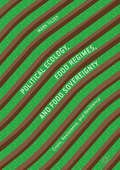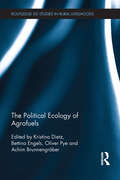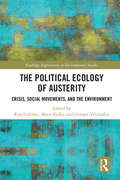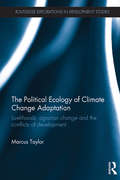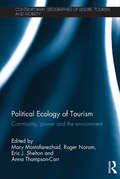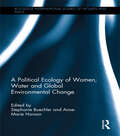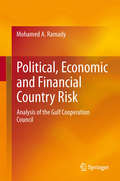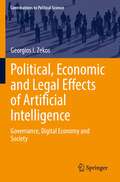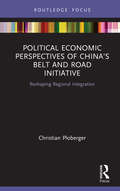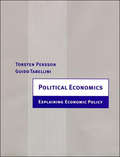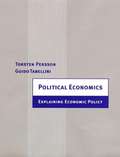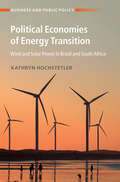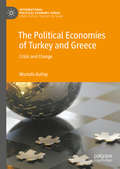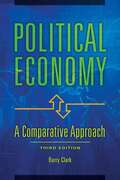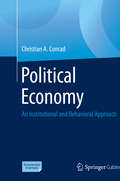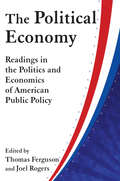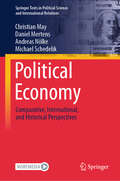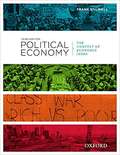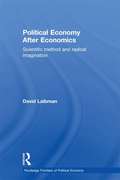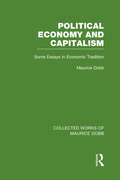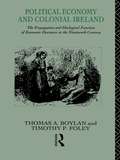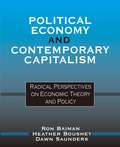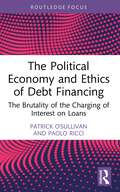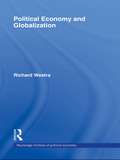- Table View
- List View
Political Ecology, Food Regimes, and Food Sovereignty
by Mark TilzeyThis book asks how we are to understand the relationship between capitalism and the environment, capitalism and food, and capitalism and social resistance. These questions come together to form a study of food regimes and the means by which capitalism organises both the environment and people to provision its distinctive system of ever-expanding consumption with food. Political Ecology, Food Regimes, and Food Sovereignty explores whether there are environmental limits to capitalism and its economic growth by addressing the ongoing and inter-linked crises of food, fossil fuels, and finance. It also considers its political limits, as the globally burgeoning 'precariat', peasants and indigenous people resist the further commodification of their livelihoods. This book draws from the field of Political Ecology to approach new ways of analysing capitalism, the environment and resistance, and also to propose new solutions to the current agro-ecological-economic crisis. It will be of particular interest to students and academics of Environmental Sociology, Human Geography, and Environmental Geography.
The Political Ecology of Agrofuels (Routledge ISS Studies in Rural Livelihoods)
by Kristina Dietz, Bettina Engels, Oliver Pye and Achim BrunnengräberThis book explores the political ecology of agrofuels as an encompassing socio-spatial transformation process consisting of a series of changing contexts, political reconfigurations, and the restructuring of social and labour relations. It includes conceptual chapters as well as case studies from different world regions (North America, Europe, Latin America, sub-Saharan Africa, Asia) and levels (local, national, transnational). The Political Ecology of Agrofuels advances a conceptualisation of agrofuels that helps to fill existing research gaps. It covers global food regimes and agrarian politics as well as political arenas such as energy, climate, transport and trade. It reflects on the biophysical materiality of agrofuels, new forms of nature appropriation, struggles, discursive framings, the building of hegemony, shifting geopolitical constellations, socio-spatial configurations of power, the construction of territory, the agency of social movements and the different ways in which agrofuels are politicized at different scales. This book asks how patterns of mobility, emissions regulation, food and energy production and consumption, and social relations (e.g. labour, class and gender relations) are shaped and re-shaped by the materiality and representations of agrofuels in both the Global South and North. The book provides tools for thinking about the diversity of the conflicts, struggles and spatial, socio-ecological and politico-economic reconfigurations and perpetuations engendered by current production and consumption patterns in the agrofuel sector.
The Political Ecology of Austerity: Crisis, Social Movements, and the Environment (Routledge Explorations in Environmental Studies)
by Rita Calvário Maria Kaika Giorgos VelegrakisThe Political Ecology of Austerity explores the environmental dimension of austerity that has thus far escaped academic, policy, and media attention. Offering a better comprehension of the full socio-environmental impact of austerity measures, the book highlights the importance of considering environmental issues when designing responses to economic crisis in the future. Mobilising detailed case studies from across the world, the volume documents the ways in which austerity impacts global and local ecologies, shapes environmental conflicts and gives rise to new forms and practices of social moblisation and resistance. Bringing together theoretical debates and rigorous case studies, the book proposes ‘the political ecology of austerity’ as an appropriate method of analysis that can inform our understanding of the shift in environmental protection policies and the intensification of growth practices (green or otherwise) that followed the 2008 global economic crisis. The Political Ecology of Austerity discloses austerity to be a globalised set of tools not only for budgetary discipline, but also for socio-environmental discipline that justifies the continuation of capital accumulation at the expense of further global environmental degradation. This book will be of great interest to students and scholars of social and political sciences, environmental studies, urban studies, and political ecology.
The Political Ecology of Climate Change Adaptation: Livelihoods, agrarian change and the conflicts of development (Routledge Explorations in Development Studies)
by Marcus TaylorThis book provides the first systematic critique of the concept of climate change adaptation within the field of international development. Drawing on a reworked political ecology framework, it argues that climate is not something ‘out there’ that we adapt to. Instead, it is part of the social and biophysical forces through which our lived environments are actively yet unevenly produced. From this original foundation, the book challenges us to rethink the concepts of climate change, vulnerability, resilience and adaptive capacity in transformed ways. With case studies drawn from Pakistan, India and Mongolia, it demonstrates concretely how climatic change emerges as a dynamic force in the ongoing transformation of contested rural landscapes. In crafting this synthesis, the book recalibrates the frameworks we use to envisage climatic change in the context of contemporary debates over development, livelihoods and poverty. With its unique theoretical contribution and case study material, this book will appeal to researchers and students in environmental studies, sociology, geography, politics and development studies.
Political Ecology of Tourism: Community, power and the environment (Contemporary Geographies of Leisure, Tourism and Mobility)
by Mary Mostafanezhad Roger Norum Eric J. Shelton Anna Thompson-CarrWhy has political ecology been assigned so little attention in tourism studies, despite its broad and critical interrogation of environment and politics? As the first full-length treatment of a political ecology of tourism, the collection addresses this lacuna and calls for the further establishment of this emerging interdisciplinary subfield. Drawing on recent trends in geography, anthropology, and environmental and tourism studies, Political Ecology of Tourism: Communities, Power and the Environment employs a political ecology approach to the analysis of tourism through three interrelated themes: Communities and Power, Conservation and Control, and Development and Conflict. While geographically broad in scope—with chapters that span Central and South America to Africa, and South, Southeast, and East Asia to Europe and Greenland—the collection illustrates how tourism-related environmental challenges are shared across prodigious geographical distances, while also attending to the nuanced ways they materialize in local contexts and therefore demand the historically situated, place-based and multi-scalar approach of political ecology. This collection advances our understanding of the role of political, economic and environmental concerns in tourism practice. It offers readers a political ecology framework from which to address tourism-related issues and themes such as development, identity politics, environmental subjectivities, environmental degradation, land and resources conflict, and indigenous ecologies. Finally, the collection is bookended by a pair of essays from two of the most distinguished scholars working in the subfield: Rosaleen Duffy (foreword) and James Igoe (afterword). This collection will be valuable reading for scholars and practitioners alike who share a critical interest in the intersection of tourism, politics and the environment
A Political Ecology of Women, Water and Global Environmental Change (Routledge International Studies of Women and Place)
by Stephanie Buechler Anne-Marie S. HansonThis edited volume explores how a feminist political ecology framework can bring fresh insights to the study of rural and urban livelihoods dependent on vulnerable rivers, lakes, watersheds, wetlands and coastal environments. Bringing together political ecologists and feminist scholars from multiple disciplines, the book develops solution-oriented advances to theory, policy and planning to tackle the complexity of these global environmental changes. Using applied research on the contemporary management of groundwater, springs, rivers, lakes, watersheds and coastal wetlands in Central and South Asia, Northern, Central and Southern Africa, and South and North America, the authors draw on a variety of methodological perspectives and new theoretical approaches to demonstrate the importance of considering multiple layers of social difference as produced by and central to the effective governance and local management of water resources. This unique collection employs a unifying feminist political ecology framework that emphasizes the ways that gender interacts with other social and geographical locations of water resource users. In doing so, the book further questions the normative gender discourses that underlie policies and practices surrounding rural and urban water management and climate change, water pollution, large-scale development and dams, water for crop and livestock production and processing, resource knowledge and expertise, and critical livelihood studies. This book will be of interest to students and scholars of environmental studies, development studies, feminist and environmental geography, anthropology, sociology, environmental philosophy, public policy, planning, media studies, Latin American and other area studies, as well as women’s and gender studies.
Political, Economic and Financial Country Risk
by Mohamed A. Ramady"Decades go by and nothing happens; then weeks go by and decades happen". This apt saying encapsulates the dramatic convulsions taking place across the Arab world that first erupted in 2011 in Tunisia and which rapidly spread to other countries. These events have affected the lives of ordinary citizens in many more ways than had been intended when the 'Arab Spring' broke out, with the endgame still not very clear as demonstrated in countries like Egypt, Syria and Libya. By comparison, with some exceptions, the six countries comprising the Gulf Cooperation Council have been relatively unaffected by the general turbulence and uncertainties lapping around them. However, geopolitical shifts involving global superpower rivalries, combined with revolutionary breakthroughs in the non-conventional hydrocarbon energy sector are threatening to challenge the importance of the Arabian Gulf as the world's leading suppliers of energy, putting their economies under fiscal stress. The author examines such challenges by: * Providing the first in-depth statistical analytical assessment of the GCC countries using monthly data over the period 2001 -2013 for the three risk categories- economic, financial and political risks- and their sub -components so as to enable policymakers enhance components with low risk , while addressing components with perceived higher risk, * Assessing FDI and capital inflows and outflows before and after the "Arab Spring" , and how to encourage FDI inflows, * Inter -Arab and GCC trade and synergies in power transmission , transportation links and establishing new hubs of centers of manufacturing excellence , * Exploring private sector-led growth models to reduce forecasted unemployment. Being complacent is not an option for the GCC. The aim of the book is that having a better understanding of each of the GCC countries' individual risk parameters will enable the GCC meet future challenges and reduce the chances of a negative 'Arab Spring' occurring in the region. Mohamed Ramady is a Visiting Associate Professor at the Department of Finance and Economics, King Fahd University of Petroleum and Minerals. His main research interests are the economics of the Middle East and Saudi Arabia in particular, as well as money and banking He also held senior positions with international financial institutions in the Arabian Gulf and Europe.
Political, Economic and Legal Effects of Artificial Intelligence: Governance, Digital Economy and Society (Contributions to Political Science)
by Georgios I. ZekosThis book presents a comprehensive analysis of the alterations and problems caused by new technologies in all fields of politics. It further examines the impact of artificial intelligence (AI) on the nexus between politics, economics, and law. The book raises and answers several important questions: What is the role of AI in politics? Are people prepared for the challenges presented by technical developments? How will Al affect future politics and human society? How can politics and law deal with Al's disruptive technologies? What impact will AI and technology have on law? How can efficient cooperation between human beings and AI be shaped? Can artificial intelligence automate public decision-making?Topics discussed in the book include, but are not limited to digital governance, public administration, digital economy, corruption, democracy and voting, legal singularity, separation of power, constitutional rights, GDPR in politics, AI personhood, digital politics, cyberspace sovereignty, cyberspace transactions, and human rights. This book is a must-read for scholars and students of political science, law, and economics, as well as policy-makers and practitioners, interested in a better understanding of political, legal, and economic aspects and issues of AI.
Political Economic Perspectives of China’s Belt and Road Initiative: Reshaping Regional Integration (Routledge Focus on Public Governance in Asia)
by Christian PlobergerThe book begins with an overview on China's Belt and Road Initiative, highlighting its complex character as a domestic and international development strategy, and by offering an up-to date evaluation of it. In response to this complexity, the book attempts to highlight the Belt and Road Initiative’s double character and how it will address primary domestic development challenges the Chinese government is facing by adding an international focus to a domestic development strategy. This in turn supports the understanding of China’s political-economic policy and strategy formulation by reminding that supporting China’s domestic development is still the primary task of its government. Even as the domestic aspect of the Belt and Road Initiative is highlighted, its regional and international relevance cannot be ignored either. The Belt and Road Initiative will support a continuation of the persisting debate about the impact China’s rise generate, and to what extent China can be characterized as a satisfied status-quo power or a dissatisfied, revisionist power. In this context, the book also draw attention to the various impacts the Belt and Road Initiative generates in different regional settings. However, the book also identifies some of the limitations of China’s Belt and Road Initiative encounters despite the seemingly convincing economic goals it offers, and explains why a few of the countries, like India, are resisting the lure.
Political Economics: Explaining Economic Policy (Zeuthen Lectures)
by Torsten Persson Guido TabelliniWhat determines the size and form of redistributive programs, the extent and type of public goods provision, the burden of taxation across alternative tax bases, the size of government deficits, and the stance of monetary policy during the course of business and electoral cycles? A large and rapidly growing literature in political economics attempts to answer these questions. But so far there is little consensus on the answers and disagreement on the appropriate mode of analysis.Combining the best of three separate traditions—the theory of macroeconomic policy, public choice, and rational choice in political science—Torsten Persson and Guido Tabellini suggest a unified approach to the field. As in modern macroeconomics, individual citizens behave rationally, their preferences over economic outcomes inducing preferences over policy. As in public choice, the delegation of policy decisions to elected representatives may give rise to agency problems between voters and politicians. And, as in rational choice, political institutions shape the procedures for setting policy and electing politicians. The authors outline a common method of analysis, establish several new results, and identify the main outstanding problems.
Political Economics: Explaining Economic Policy
by Torsten Persson Guido Enrico TabelliniWhat determines the size and form of redistributive programs, the extent and type of public goods provision, the burden of taxation across alternative tax bases, the size of government deficits, and the stance of monetary policy during the course of business and electoral cycles? A large and rapidly growing literature in political economics attempts to answer these questions. But so far there is little consensus on the answers and disagreement on the appropriate mode of analysis. Combining the best of three separate traditions--the theory of macroeconomic policy, public choice, and rational choice in political science--Torsten Persson and Guido Tabellini suggest a unified approach to the field. As in modern macroeconomics, individual citizens behave rationally, their preferences over economic outcomes inducing preferences over policy. As in public choice, the delegation of policy decisions to elected representatives may give rise to agency problems between voters and politicians. And, as in rational choice, political institutions shape the procedures for setting policy and electing politicians. The authors outline a common method of analysis, establish several new results, and identify the main outstanding problems.
Political Economies of Empire in the Early Modern Mediterranean
by Maria FusaroAgainst the backdrop of England's emergence as a major economic power, the development of early modern capitalism in general and the transformation of the Mediterranean, Maria Fusaro presents a new perspective on the onset of Venetian decline. Examining the significant commercial relationship between these two European empires during the period 1450–1700, Fusaro demonstrates how Venice's social, political and economic circumstances shaped the English mercantile community in unique ways. By focusing on the commercial interaction between Venice and England, she also re-establishes the analysis of the maritime political economy as an essential constituent of the Venetian state political economy. This challenging interpretation of some classic issues of early modern history will be of profound interest to economic, social and legal historians and provides a stimulating addition to current debates in imperial history, especially on the economic relationship between different empires and the socio-economic interaction between 'rulers and ruled'.
Political Economies of Energy Transition: Wind and Solar Power in Brazil and South Africa (Business and Public Policy)
by Kathryn HochstetlerGlobal climate solutions depend on low-carbon energy transitions in developing countries, but little is known about how those will unfold. Examining the transitions of Brazil and South Africa, Hochstetler reveals how choices about wind and solar power respond to four different constellations of interests and institutions, or four simultaneous political economies of energy transition. The political economy of climate change set Brazil and South Africa on different tracks, with South Africa's coal-based electricity system fighting against an existential threat. Since deforestation dominates Brazil's climate emissions, climate concerns were secondary there for electricity planning. Both saw significant mobilization around industrial policy and cost and consumption issues, showing the importance of economic considerations for electricity choices in emerging economies. Host communities resisted Brazilian wind power, but accepted other forms. Hochstetler argues that national energy transition finally depends on the intersection of these political economies, with South Africa illustrating a politicized transition mode and Brazil presenting a bureaucracy-dominant one.
The Political Economies of Turkey and Greece: Crisis and Change (International Political Economy Series)
by Mustafa KutlayThe economic policies of reactive states such as Turkey and Greece, both of which have shown limited ability to implement institutional reforms in recent years, have paved the way for deep crises. The crises are devastating for both societies’ social fabric, but they also open up the opportunity to introduce new economic regimes. They do, however, not always invite changes in dominant paradigms. Despite weak state capacity and deep economic crisis in both cases, substantial reforms were initiated in Turkey whilst an opposite trend prevailed in Greece. Drawing on field research, this book develops a political economy framework that explains reform cycles and post-crisis outcomes in reactive states.
Political Economy: A Comparative Approach, 3rd Edition
by Barry ClarkAs 21st-century political debate becomes polarized across ideological lines, students and citizens need to understand the underlying values on which contending arguments are based. The current political gridlock calls for a deeper appreciation of the competing perspectives in political economy. Now revamped for a third edition, Political Economy: A Comparative Approach supplies a truly interdisciplinary examination of the development and evolution of political economy from the Enlightenment onward, drawing material from the realms of political theory, sociology, philosophy, and history as well as from economics to present detailed comparisons of competing perspectives on a variety of current issues. The book begins with an introduction to political economy that provides readers with an overview of the historical development of the discipline, followed by in-depth analyses of four ideological perspectives in political economy―Classical Liberalism, Radicalism, Conservatism, and Modern Liberalism. The author then applies each of the four ideological perspectives to a range of contemporary issues, such as the role of government, economic instability, poverty, labor relations, discrimination, education, culture, the environment, and international trade. Readers will gain insight into the methods and practice of political economics as well as better understand the history of political/economic thought and the effects of historical processes―European industrialization, for example―on modern debates.
Political Economy: An Institutional and Behavioral Approach
by Christian A. ConradThis textbook takes a new approach to political economy: it combines the well-known non-quantitative theories with the findings of behavioral science and other disciplines such as psychology and sociology. The question of how people behave and how such behavior can be guided towards moral welfare for everyone is the focus of this book. The knowledge is first derived scientifically, then the results are presented in summaries and conclusions. Case studies provide a link to practice. By means of exercises and behavioral games, readers can apply and deepen their acquired knowledge.
The Political Economy: Readings in the Politics and Economics of American Public Policy (American Politics And Political Economy Ser.)
by Thomas Ferguson Joel RogersThe Political Economy is ideally suited as a supplementary text for courses in American government and politics, policy studies, business-government relations, and economic issues and policy making. It integrates selections from the very finest new and classical works of political and economic analysis, by distinguished scholars, into a comprehensive overview of the American political system.
Political Economy: Comparative, International, and Historical Perspectives (Springer Texts in Political Science and International Relations)
by Christian May Daniel Mertens Andreas Nölke Michael SchedelikThis textbook offers a comprehensive introduction to Political Economy. It combines comparative,international and historical perspectives into a holistic framework of analysis. Drawing on the workof Karl Polanyi, the book shows how capitalist economies differ around the globe and how they areembedded in the international economic order. Through a critical-institutionalist lens, it helps toaccount for the evolution of contemporary capitalism and addresses current topics at the intersection of political science and economics.Students and instructors can draw on supplementary material, such as Power Point slides withall figures and tables as well as the Springer Nature Flashcards app with exercises.
Political Economy: The Contest Of Economic Ideas
by Frank StilwellNow in its third edition, Political Economy: The Contest of Economic Ideas is a fully updated survey of the political economy and its connection with social concerns. Moving beyond conventional treatments, this unique text offers a "big-picture" overview of the analytical tools and value judgments associated with competing schools of economic thought. Featuring an exceptionally engaging writing style, this text makes the complexities of contesting economic ideas--including classical political economy and Marxist economics and neoclassical economies and neo-liberalism--clear and accessible to students. The third edition includes a new chapter on the economics of happiness and new sections on current issues like the global financial crisis, climate change, and "affluenza."
Political Economy After Economics: Scientific Method and Radical Imagination (Routledge Frontiers Of Political Economy Ser. #148)
by David LaibmanThis re-incorporation of economics into political economy is one (small, but not insignificant) element in a larger project: to place all of the resources of present-day social-scientific research at the service of increasing democracy, in an ultimate direction toward socialism in the classic sense. An economics-enriched political economy is, above all, empowering: working people in general can calculate, build models, think theoretically, and contribute to a human-worthy future, rather than leaving all this to their "betters."
Political Economy and Capitalism: Some Essays in Economic Tradition
by Maurice DobbThis volume examines questions concerning the nature and behaviour of capitalism and the development of economic thought and the relation between economic thought and practice in the early twentieth century.
Political Economy and Colonial Ireland: The Propagation and Ideological Functions of Economic Discourse in the Nineteenth Century
by Thomas Boylan Tadhg Foley`I believe that next to good Religious education, a sound knowledge of Political Economy would tend as much to tranquilize this country, if not more, than any other branch of knowledge that can be taught in schools.' - Cork Schools Inspector, 1853 In a nineteenth century Ireland that was divided socially, economically, politically and denominationally, consensus was sought in the new discipline of political economy, which claimed to be scientifically impartial and to transcend all divisions. The authors explore the ideological mission of political economy, and the reasons for the failure of that mission in the wake of the crisis induced by the great famine of 1846/47.
Political Economy and Contemporary Capitalism: Radical Perspectives on Economic Theory and Policy
by Heather Boushey Ron P. Baiman Dawn SaundersThis volume covers the theoretical method, macroeconomics, microeconomics, international trade and finance, development, and policy of economic theory. It incorporates various alternative approaches as well as a broad spectrum of policy issues.
The Political Economy and Ethics of Debt Financing: The Brutality of the Charging of Interest on Loans (Routledge Frontiers of Political Economy)
by Patrick O'Sullivan Paolo RicciThis book takes a fresh look at an age-old controversy in ethics and political economy that stretches right back to Aristotle: the morality and the economics of debt financing, or the charging of interest on loans. It endeavours to show the immense relevance of those ancient debates in the contemporary economy.Outside of countries which practise Islam and Islamic finance, the charging of interest is taken completely for granted today and little or no thought is devoted to its morality or economic and social impacts. This book argues that in fact the question of the morality of charging interest is still debatable and deserves to be considered anew in the 21st century for the light it can shine on certain salient contemporary sources of economic malaise. This book will first of all review the ancient debates on these questions stretching back to Aristotle seeking to restate the concerns in terms of contemporary economic theories and realities. It will also then delve into the current practices in respect of lending of all kinds that can be found in those Islamic countries and financial institutions which endeavour to follow the prohibition of riba (charging of any kind of interest). This will be contrasted with the impact of interest and debt financing in the contemporary non-Islamic economies arguing that debt financing of businesses promotes greater rates of bankruptcy over the business cycle and that the charging of interest on loans for current consumption purposes will over time increase inequality and inequitable concentration of wealth in societies where it is practised. It will also be shown how in a system without predetermined interest charges problems of exponentially exploding government debt could largely and neatly be avoided by linking bondholder rewards to levels of fiscal proceeds of states.This book will be of significant interest to readers in ethics, moral philosophy and political economy as well as to policymakers and thinkers grappling with issues around debt burdens (public and private), inequality and fairness.
Political Economy and Globalization (Routledge Frontiers Of Political Economy Ser. #124)
by Richard WestraBased upon distinguishing capitalism from other economic systems, as well as analysis of capitalist change across its stages of development, Richard Westra argues that the economic tendencies we refer to as globalization constitute a world historic transition away from capitalism. Westra forcefully rejects claims from both Right and Left sides of economic debate that globalization embodies the ultimate world diffusion of capitalism. He concludes that the choice facing humanity is no longer between capitalism and socialism but between socialism and global barbarism. The argument is meticulously interwoven through four key foci of political economy - The role of Marx’s Capital in producing knowledge of capitalism, The periodizing of capitalism and study of its historical models, The altering trajectories of production and finance under current globalization, The place of socialism in a progressive future. A central point of the book is that determinations over the capitalist substance of existing economies demand precise understanding of how in its basic operation capitalism manages to secure the economic reproducibility of human society in the first place. To make the case for the passing of capitalism from history the volume draws upon the novel Japanese Uno approach to Marxian political economy. From the pages of Political Economy and Globalization emerges a grim picture of our human future should current economic trends persist. It also offers a positive vision for socio-material betterment in redistributive, eco-sensitive socialist societies of tomorrow. This is a must read book for scholars, students, progressive policy makers and activists.
